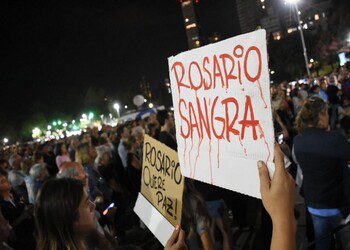The ongoing fragmentation of Argentina’s most powerful criminal group, the Monos, has led to a strategic rethink about how security forces should tackle violence in the northern city of Rosario.
In response to spiraling violence, President Alberto Fernández launched what he described as a multipronged strategy against organized crime in the city on March 7. His plan included a deployment of army and security personnel, a new delegation to combat money laundering, and 600 cameras with facial recognition to be sent to Rosario.
Among the units deployed are army engineers, who will not be involved in law enforcement, instead taking on unspecified “urbanization” projects in poorer areas with higher crime rates.
“It’s something more symbolic,” Marco Iazzerta, a researcher at the National University of Rosario, told InSight Crime.
While Rosario has been Argentina’s most violent city for several years, this new deployment comes after a recent shooting at a supermarket owned by Lionel Messi’s wife brought increased scrutiny. Two more shootings, one at a school and another that killed an 11-year-old boy and injured three other children, further pressured the government to act.
Why Are Murders Spreading Across Argentina’s Most Violent City?
Violence in Rosario set a record in 2022 with 287 homicides. So far in 2023, the city saw 65 murders in 65 days, placing it on track for another difficult year, according to national media citing statistics from the Santa Fe Public Security Observatory. According to official figures, almost two-thirds of Rosario’s homicides are due to organized crime.
For over two decades, the Monos have been the dominant criminal force in Rosario, growing rich off extortion and drug trafficking, and ruthlessly fighting smaller yet driven rivals like the Alvarado Clan. But the jailing of their top leaders and internal disputes have caused a struggle to maintain cohesion, leading to its current fragmentation.
InSight Crime Analysis
The Monos appear to be undergoing a fragmentation process common to larger criminal groups across Latin America and which may bring more violent competition for criminal economies in Rosario.
“The Monos as an organization no longer exists. It’s not a homogenous, structured group under a leader, rather members of the Cantero clan have their own autonomous activities and often end up fighting among themselves,” Iazzeta told InSight Crime.
The Cantero family has been the driving force behind the Monos, providing its foremost leaders since the 1990s. But as the group increasingly used violence to secure its extortion and drug trafficking profits, authorities cracked down. Its last overall leader, Máximo Ariel Cantero, alias “Guille,” was sentenced to over 84 years in jail for a slew of criminal charges.
For a while, it seemed like Guille could continue wielding influence from behind bars as judges, prosecutors, and witnesses involved in his case were attacked and threatened.
But according to an investigation by the Argentine newspaper La Nación, four Monos factions now fight for control of Rosario, each run by different Cantero relatives.
“There’s no criminal actor with the hegemony to impose conditions on the other groups,” added Iazetta.
Families in Rosario, Argentina, Paint Homes to Avoid Attacks
It is into this confusing backdrop that Argentine troops will be deployed. While President Fernández swore the deployment would not lead to more violence, human rights groups have remained critical, comparing it to previous instances of opaque army involvement in urban violence in Mexico and Colombia.
“The armed forces are being sent to places where they shouldn’t intervene, in contexts for which they are not trained and where the aim of their [presence] is unclear,” wrote Argentina’s Center for Legal and Social Studies (Centro de Estudios Legales y Sociales – CELS) on Twitter.

